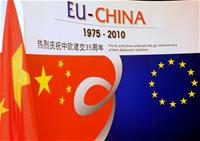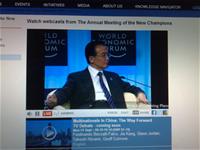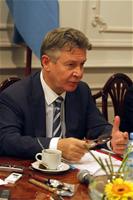Size does matter
Adelina Marini, September 24, 2010
 That size does matter becomes especially clear in geopolitical terms. The question is, however, what matter and which size precisely. More or less this is how we can draw a general conclusion from the debate in the European Parliament this week on the EU-China summit which is to be held on October 6 in Brussels. This summit is charged with serious expectations which becomes clear not only from the plenary debate but also from the European Council, that was held only several days earlier and was specially dedicated to EU's common foreign policy. Then EU leaders set the tone of EU's future relations with its strategic partners, among which China - reciprocity and trade (in the both meanings of the word).
That size does matter becomes especially clear in geopolitical terms. The question is, however, what matter and which size precisely. More or less this is how we can draw a general conclusion from the debate in the European Parliament this week on the EU-China summit which is to be held on October 6 in Brussels. This summit is charged with serious expectations which becomes clear not only from the plenary debate but also from the European Council, that was held only several days earlier and was specially dedicated to EU's common foreign policy. Then EU leaders set the tone of EU's future relations with its strategic partners, among which China - reciprocity and trade (in the both meanings of the word).
How big is China?
From the debate in the European Parliament, attended by very few of the more than 700 MEPs, we can outline the following issues the EU has in its relations with China:
- the EU is China's largest trade partner and China is the second largest partner of the Union;
- access to the Chinese market;
- trade policy and, most of all, the trade deficit which the EU is not happy with;
- climate change against the backdrop of the Cancun conference that is to take place in the end of the year;
- human rights, democracy, political and civil freedoms.
The way these issues are listed they correspond to their order of importance, according to what we heard during the 1-hour debate with the participation of the Trade Commissioner Karel de Gucht. The biggest problem remains the fact that although being China's largest partner, the EU still has problems with the access to public procurement tenders in China, with the freedom of creation of firms locally, the labour conditions and protection of employers and employees. In fact, it was on this issue that the Chines premier Wen Jiabao made a very important statement during the summer Davos in Tianjin on September 13. There he said that all companies in China are being treated equally no matter if they are national or Chinese.
As an MEP defined it, "the Chinese market is very attractive for European  businesses but it is a jungle or laws and rules which change constantly". Indirectly, Mr Wen responded to this criticism as well, by admitting that indeed regulation in China is not at the best level possible but a lot of efforts are being invested so that this could change.
businesses but it is a jungle or laws and rules which change constantly". Indirectly, Mr Wen responded to this criticism as well, by admitting that indeed regulation in China is not at the best level possible but a lot of efforts are being invested so that this could change.
The EU should also clearly state before its Chinese partners that it can no longer see low wages and dangerous conditions of labour as natural advantages. This is now being removed to the column "social-economic and trade dumping".
China indeed is big but its economy is developing with impressing speed. This is why Beijing has to stop hiding behind the relative term "developing nation" and grasp its responsibility globally. As Commissioner Karel de Gucht put it, "China has a shared responsibility on global issues. This is not only about economy, climate change, resources or else, this is a shared responsibility".
Of course there were also opinions that the EU should again state, even more firmly, that it sticks to its basic values - human rights, democracy, civil and social freedoms. Let us not forget also Tibet and Taiwan. There were, however, positions that the approach toward China should be pragmatic and the fundamental European values should be put aside for the next level of Sino-European relations.
Reciprocity
This word, mentioned somehow in between other things by the European Council president Herman van Rompuy during the European Council on foreign policy on September 16, obviously had integrated deeply in EU's agenda. The word was used several times during this week's debate in Parliament and the Trade Commissioner Karel de Gucht, explaining what the European approach for the EU-China summit will be, revealed a little but significant information about the communication the Commission is to present this autumn on the new European trade strategy.
 Without being elaborate enough, Mr De Gucht explained that new tools are being prepared now for intervention in trade relations. He mentioned several times that these tools will not be directed only to China, but when a country would close its market (be it for public procurement tenders or else) "we can retaliate by doing the same with our markets and close them. I am a big supporter of openness but this means reciprocity".
Without being elaborate enough, Mr De Gucht explained that new tools are being prepared now for intervention in trade relations. He mentioned several times that these tools will not be directed only to China, but when a country would close its market (be it for public procurement tenders or else) "we can retaliate by doing the same with our markets and close them. I am a big supporter of openness but this means reciprocity".
What is the size of the matter?
The fact that such an intensive preparatory work is going on for the Sino-European summit confirms EU leaders commitments that Europe is very interested in its strategic partners. The questions is, however, how the Union is realising this significance. EUobserver quoted foreign policy analysts who said that this significance does not correspond to the commitments, at least because the summit with China will be held in the same day with another summit with a strategic partner - South Korea, with which the EU will sign an entirely new free trade agreement.
Some MEP's criticised Union's leadership for the absence in the plenary of a representative of the Foreign Affairs Council and that, in fact, it would have been best if Catherine Ashton herself attended the debate in her capacity of High Representative for foreign relations. According to the agreement, reached among the Commission, the Council and the Parliament for the establishment of the European diplomatic service, representatives of the three institutions should take part in the dialogue with EU's strategic partners. In the plenary, however, only Karel de Gucht was present, which was a good illustration of the complex construction of the EU.
He attended in his capacity both as a representative of the Commission and the Council because, according to the troika agreement, Catherine Ashton's deputies are the Commissioners that have external dimension of their portfolios. Those are the Commissioners for trade, development, enlargement, humanitarian aid. As Karel de Gucht said: "today I have a double hat".
And with regard to the matter of size, it is obvious that China is of great importance to the EU. More obvious is though that the Union itself is not quite aware how to express this significance. Furthermore, the Union still has troubles with expressing its own significance as a size of the sum of 27 economies. This was especially evident during the parliamentary debate in Strasbourg where only one MEP raised the issue of the real value of the renminbi (the Chinese yuan). This was Ioannis Kasoulides from the EPP. He called on the EU to ask for further appreciation of the Chinese national currency in order to restore the world currency order.
This is one of the main problems between the US and China, a reason for regular clashes between the two countries. If the EU would raise this issue too in Brussels on October 6, it will hit two rabbits with only one bullet - on the one hand it will show China that this issue is of concern for the European economy too, and on the other - it would give a serious support to its transatlantic partner in a very difficult time. This would also set an even stronger tone for the upcoming November EU-US summit.